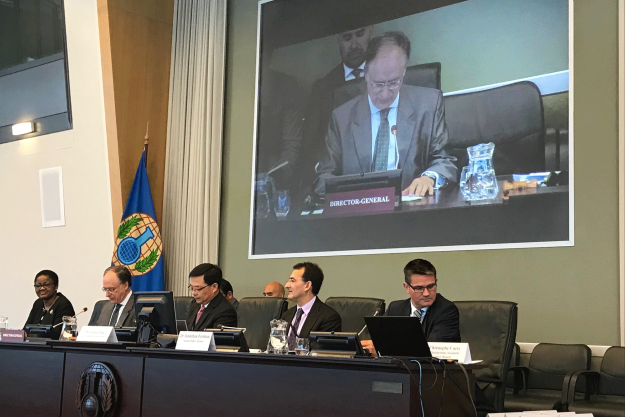THE HAGUE, Netherlands — 19 June 2019 — The Scientific Advisory Board (SAB) of the Organisation for the Prohibition of Chemical Weapons (OPCW) marked the beginning of its next scientific review cycle with the Twenty-Eighth Session meeting, held at OPCW Headquarters in The Hague from 10 – 14 June.
Opening the event, OPCW’s Director-General, H.E. Mr Fernando Arias, thanked the Board for the comprehensive scientific review provided to the Fourth Review Conference of the Chemical Weapons Convention (CWC) held last November. He further commended the Board as an example of productive collaboration and consensus building amongst international scientists.
Recognising that science and technology will continue advancing rapidly, leaving profound implications for the Convention, the Director-General expressed the view that: “Scientific advice for our decision makers must be practical and understandable. This valuable advice must address the needs of the OPCW, as well as guide the OPCW in seizing opportunities arising from technological change.”
Over the course of the week-long meeting, SAB members developed a roadmap for the next scientific review cycle to inform the discussions about the Organisation’s strategic direction at the Fifth Review Conference in 2023.
During the session, Technical Secretariat staff provided briefings in key areas, such as new tools and scientific approaches to address the challenges of the OPCW’s dynamic and unpredictable operating environment. Findings from the three reports issued by the SAB’s temporary working group on investigative science were reviewed to develop recommendations for the Director-General. Additionally, the SAB received presentations from invited guest speakers on legacy chemical weapons, biomarkers of chemical agent exposure, decontamination, digitalisation and artificial intelligence applications in chemistry.
The session concluded with a briefing from the SAB Chair and Vice-Chair, Mr Cheng Tang and Mr Christophe Curty, to a group of 34 OPCW Member States. Mr Tang advised the delegations that we are now living in an era of unprecedented scientific advancement with equally unprecedented access to, and diffusion of, scientific knowledge. He further stated, “As the dynamism of science can both improve and undermine an effective disarmament regime, the SAB must continue its efforts to review and advise on the impact of these developments on the CWC”.
The SAB welcomed four new members: Professor Mustafa Ghanei of the Islamic Republic of Iran; Mr Wlifred Jwalshik of Nigeria; Dr Andrea Leisewitz of Chile; and Mr Günter Povoden of Austria.
The report of the Twenty-Eighth Session of the SAB will be released in several weeks.

OPCW Director-General opening the Twenty-Eighth Session meeting of the SAB
Background
The Scientific Advisory Board is comprised of 25 independent experts from OPCW Member States, and advises the OPCW Director-General on scientific and technological issues relevant to the implementation of the Chemical Weapons Convention.
As the implementing body for the Chemical Weapons Convention, the OPCW, with its 193 Member States, oversees the global endeavour to permanently eliminate chemical weapons. Since the Convention’s entry into force in 1997, it is the most successful disarmament treaty eliminating an entire class of weapons of mass destruction.
Over 97% of all chemical weapon stockpiles declared by possessor States have been destroyed under OPCW verification. For its extensive efforts in eliminating chemical weapons, the OPCW received the 2013 Nobel Peace Prize.
More Information
- Scientific Advisory Board
- Science and Technology at the OPCW
- Report of the Scientific Advisory Board to the Fourth Review Conference (Executive Summary)
- Report of the Scientific Advisory Board to the Fourth Review Conference (Full Report)
- First Report of the Scientific Advisory Board’s temporary working group on investigative science
- Second Report of the Scientific Advisory Board’s temporary working group on investigative science
- Third Report of the Scientific Advisory Board’s temporary working group on investigative science
